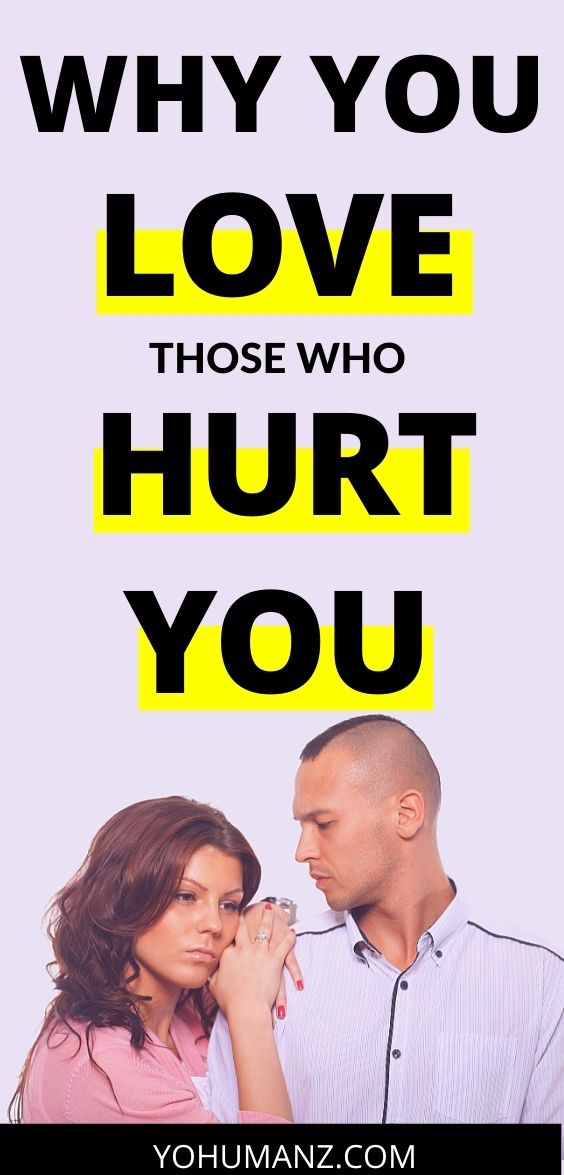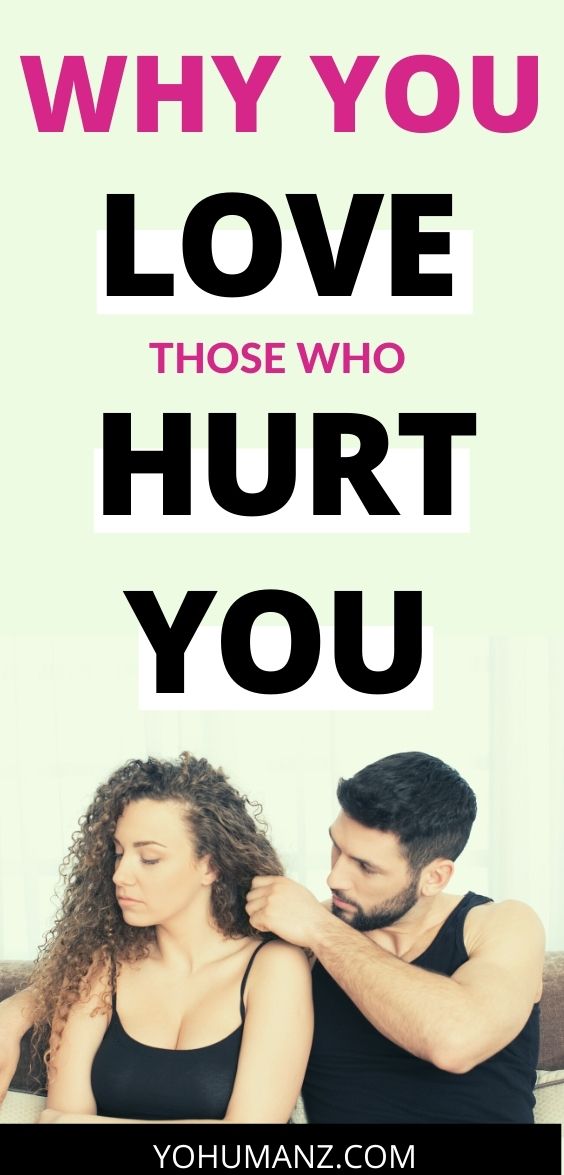Table of Contents
Sadly, I’m probably a great person to write this post.
I’ve loved people who hurt me—a lot.
I’ve known it was wrong and continued to stay.
There’s many reasons why it happens.
And no, I’m not going to tell you to love yourself more (although maybe you should, you’re awesome!).
Instead, I’m going to point out x reasons why we love the people who hurt us.
And hopefully, shed some insight on how to break painful bonds.
Why You Love People Who Hurt You

There’s a variety of reasons why we love the people who hurt us. Read on and see which may ring true for you.
#1 Childhood or Young Adult Trauma
To go psych 101 on why you love people who hurt you, look at your childhood and adolescents. Are there any patterns you’re recreating today? At first, it can be hard to see because it feels so natural. But if we keep this thought in our mind, we may begin to notice similarities.
If we experienced a relationship where hurt and love were intertwined while growing up, it makes it more likely we will repeat those behaviors in adulthood. Research has shown that adverse childhood experiences (ACE) are associated with the partner you choose–and your relationship with them. For example, studies show that daughters of alcoholics are twice as likely to marry an alcoholic.
Whether a family member or partner in young adulthood caused us hurt, this can be sort of “programmed” into our brain. As a result, we seek out people who follow those patterns. They feel natural. They feel like home.
This is why you might continue loving someone who hurt you in the same way your dad or mother did. For example, perhaps you grew up with a narcissistic mothers and now all your relationships are with narcissistic men who hurt you similarly.
Recognizing these patterns is a good starting place to detaching from people who hurt you. If the wounds run deep—or even if they don’t—a therapist can help you safely work through them.
#2 We Have an Anxious Attachment Style
Attachment styles are typically related to how we grew up, as we talked about above. There are 3 main types of attachment styles:
- Secure
- Anxious-preoccupied
- Fearful-avoidant
- Dismissive-avoidant
Originally, psychologists came up with the theory of attachment styles to explain how children bond with parents. However, now we also understand they can be applied to any relationships, including romantic ones.
People with an anxious attachment style can find it really hard to let someone go. They are usually the ones to reach out and patch things up, even if they’re in the right and are hurt by another’s actions. To prevent us from the anxiety of detaching, we keep the person around, even when they have bad behavior.
If you think you have an anxious attachment style, you should know that it’s usually best to be with people who have a secure attachment style. And if the person you love is repeatedly hurting you, it can usually be assumed they’re not secure.
#3 It’s Not Love
Some people say that if you love someone who hurts you, it’s not love. I’m not sure I agree with this. I think you can love people who are great and who are horrible. After all, love is a reflection of our own ability, not theirs. Instead, I’d say the difference is that one is “healthy love” and the other is “unhealthy love.”
But sometimes, it really isn’t love at all. In some situations, we may confuse infatuation with love. For example, if we want a partner and somebody pays attention to us, we may automatically feel better. Like the world has turned and we’ve found the one. When they hurt us, we may accept or reject their actions, but we continue being with them anyway. It’s worth thinking about whether you love the person or love the idea of being with a person.
#4 You Don’t Want to Be Alone
Many people are afraid of being alone, so they keep people around for far too long—whether it be hurtful partners, friends or family members. In effort to keep their loneliness at bay, they continue loving someone despite the pain.
But if you pay attention to it, aren’t you still lonely? Even if you’re with the one you love, doesn’t the pain of hurt resemble the pains of being alone?
Letting go of someone who hurts us is hard—but even harder if we know we’ll end up being lonely. But it’s better to be alone with yourself and have the opportunity of meeting someone better—than to settle for someone who hurts us.
#5 We’re Good at Forgiving
Many people hold onto past hurts for a long time. But then there’s another group who forgive easily. In many cases, I’ve been a part of that group. I can see why someone did what they did and I forgive them for their actions, even if I don’t agree with them.
Forgiving easily can be a really good thing. It can help release the weight of resentment and anger. It can aid you in moving on. It can feel like closure.
But forgiving and forgetting are 2 very different things. I can forgive someone for hurting me, but because I don’t forget it, I end my relationship with them.
I’ve made the mistake many times of forgiving but not forgetting—that is, to continue with someone who has and will continue to hurt me.
For those of us who forgive too quick, we need to remind ourselves of ourselves: our hurt matters. We can say “I forgive you but I also let you go.”
#6 We Think the Pros Outweigh the Cons
If you’re in a situation where you think someone has good and bad traits, you may love them simply because you think their pros outweigh their cons. Perhaps your partner puts you down or calls you names, but they’re nice sometimes too—they plan date nights, are smart and have a good family. So, you continue loving them because there’s more good than bad.
It’s important to realize something though—the pros don’t erase the cons. As much as your partner compliments you, their put downs are not excusable. If they do 100 good things but the one thing they do is abusive, that’s not okay.
#7 You Have Compassion and Empathy
Sometimes, we love people who hurt us because we have a large amount of compassion and/or empathy. Even though we may not want to love them because it’s painful, it’s almost as if we can’t help it. For example, maybe your partner or ex says mean things to you, which you know is not okay. But at the same time, they’ve had a bad day, they inherited temper issues from their dad, they have addictions, etc.
We understand the reasons behind why people act the way they do and we have compassion for their experience. We probably know the “reason” doesn’t excuse their mean behavior. But still, we still have trouble detaching.
If you can relate to this, I feel you. It’s a hard place to be in to feel someone else’s pain while also feeling your own. It takes a strong, courageous person to see both ends. But you can do it. You can have empathy but also keep the person as far away from you as is healthy. It just means you have self-compassion too 🙂
#8 We Want to Help Them
Similar to the point above, sometimes when we love someone, we understand their problems and want to help them. Unfortunately, in this process, we can get hurt.
Whether it’s a friend, partner or family member, we might feel for the situation they’re going through and aim to soothe or support. For example, maybe your friend has an addiction or your dad has a mental health issue. These problems are causing our loved ones to act out and do hurtful things. Still, because we want to see them be happier, we stick around and support them.
Maybe they’re trying to help themselves or maybe not. In any case, it’s good to remember that boundaries are necessary. Nobody’s needs are superior to yours. And we can’t change other people, no matter how much we want.
Backing up or walking away from the hurt could make us feel like bad people. Especially if we suspect they’ll go further downhill without us. But we are the most important people in our own lives and we need to start treating ourselves like it.
#9 We Think It Will Get Better
Adding to the last point, sometimes we continue loving the people who hurt us because we genuinely believe or hope it will get better.
We’ve pointed out to our partner where they’re hurting us and how to stop. They haven’t made a lot of progress—but we think they’re trying a bit. They continue their harmful behaviors but maybe we just need to wait a bit longer until they’re healed and finally stop being so mean.
Stop waiting around. Sure, it’s possible the person will change but look at the pattern of behavior. Be honest. Is it likely? And, if they do, how long will it take? Things don’t change overnight. Are we supposed to stand the hurt for that long? No. You deserve someone who treats you well.
#10 We’re Afraid of the Future
Sometimes we continue being there for the people who hurt us because we’re afraid of that the future would look like otherwise. Even though we wouldn’t be dealing with their pain, we’d be dealing with other types of discomfort and we’re afraid.
Maybe your partner hurts you but you don’t want to split because that would mean moving out and you’re afraid to live alone. Or maybe you’re afraid you won’t find anyone better. Perhaps your parents put you down every holiday but you don’t enforce boundaries because Christmas day would look a lot different if you did.
But if we continue with the people who hurt us because we’re afraid of the future, we won’t know how much better it can be. Spend some time brainstorming and trying to get excited about the good that could eventually come from it.
#11 Because We Don’t Need to Be There Physically to Love
Maybe you’ve already distanced yourself from the one who hurts you. And maybe you still love them anyhow. That’s an important realization and lesson to learn too—that we can love someone yet minimize or delete the role they play in our lives.
To be fair, sometimes it’s like we can’t control how we feel. We can’t MAKE ourselves stop loving someone. We try and try and try. But it doesn’t work.
So let’s take some of that pressure off. If you can’t stop loving them, let the feeling play out how it will without judging it. Continue distancing yourself from the person, but accept the feeling. Have some self-compassion and be proud of yourself for staying away even though you feel the pull of love.
Summary on Why We Love People Who Hurt Us
There’s many reasons you may continue loving someone who hurts you. It could be rooted in childhood traumas, loneliness, rose-colored glasses syndrome or empathy. No matter why you’re staying despite the hurt, know that you deserve better and that it’s out there—even if we can’t see it yet 🙂



